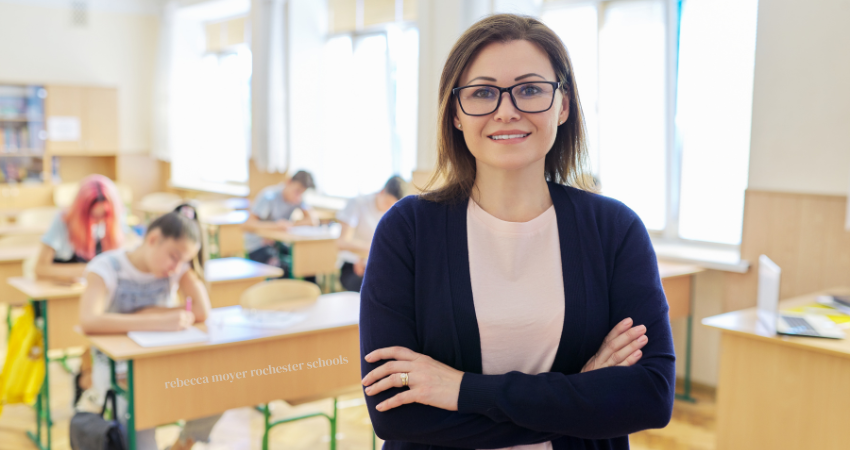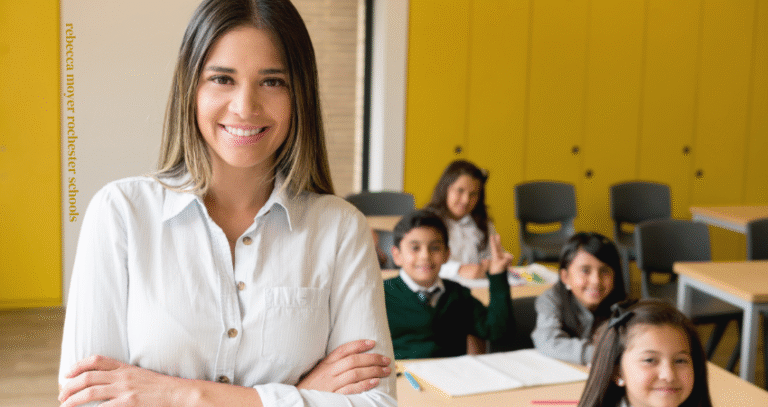Rebecca Moyer isn’t just another name in rebecca moyer rochester schools education system—she’s a catalyst for change whose passion for teaching radiates through every program she touches. Born and raised in Rochester, Moyer embodies the heart and history of the city. Over the past two decades, she’s evolved from an enthusiastic classroom teacher into a respected educational leader, mentor, and advocate for inclusive education. Her career journey is a testament to persistence and an unwavering belief that every child deserves a quality education, no matter their background or circumstances. Moyer’s story resonates because it shows how one educator’s dedication can transform not only classrooms but entire school communities.
She’s known for her practical approach, never shying away from tough conversations about equity and academic excellence. Instead, she steps in with data-backed strategies and empathy-driven methods. Through her leadership roles—ranging from curriculum advisor to district-wide professional development coordinator—Rebecca Moyer has become an influential figure whose methods are now studied, adapted, and celebrated.
Why Her Work Matters in Rochester Schools
Why does rebecca moyer rochester schools work carry so much weight in the Rochester educational landscape? Because it bridges the often-wide gap between policy and practice. While many districts struggle to translate ambitious plans into daily classroom realities, Moyer has a track record of making it happen. She focuses on building teacher capacity, creating student-centered learning environments, and making data meaningful and actionable rather than just a compliance checkbox.
Her emphasis on culturally responsive teaching resonates in Rochester, a city known for its diverse student population. Moyer recognizes that academic success isn’t about forcing every student into the same mold but rather embracing their differences and tailoring learning accordingly. This inclusive philosophy has helped Rochester schools tackle longstanding achievement gaps, particularly among historically underserved communities. By putting teachers and students at the center, her influence has not only raised test scores but also fostered a renewed sense of belonging and optimism across Rochester schools.
History of Rochester Schools and Rebecca Moyer’s Role
The Evolution of Rochester’s Education System
To appreciate Rebecca Moyer’s impact, we must first explore Rochester’s educational history—a journey marked by resilience, reinvention, and reform. Rochester’s schools date back to the mid-19th century, evolving alongside the city’s growth as a center of innovation and industry. Over time, the district has navigated shifting demographics, economic downturns, and changing educational standards. From the civil rights movement, which pushed for desegregation and equity, to the era of standardized testing and accountability, Rochester schools have continuously adapted.
Yet like many urban districts, Rochester has faced its share of challenges: underfunded schools, teacher shortages, and achievement gaps among different racial and economic groups. Against this backdrop, initiatives focusing on student equity, teacher professional development, and community partnerships became critical. These systemic issues set the stage for educators like Moyer to emerge as change agents, turning obstacles into opportunities.

Rebecca Moyer’s Contributions Over the Years
Rebecca Moyer entered Rochester schools during a transitional period when there was a strong push to modernize instruction and address equity gaps head-on. Early in her career, Moyer championed classroom strategies rooted in differentiated instruction and culturally responsive teaching—long before these terms became mainstream buzzwords. Her practical workshops and mentorship sessions helped countless teachers refine their craft.
Over the years, she advanced into roles that allowed her to drive district-wide change. Whether it was redesigning professional development, leading curriculum alignment, or piloting mentorship programs, Moyer’s fingerprint can be seen across Rochester’s evolving educational framework. Notably, she played a pivotal role in shifting the district’s culture from a compliance-driven mindset to one where teacher empowerment and student voice guide decision-making. It’s no exaggeration to say her influence helped turn theory into sustainable practice.
Educational Philosophy and Teaching Methods
Rebecca Moyer’s Approach to Inclusive Education
Rebecca Moyer’s educational philosophy isn’t just about lesson plans or curriculum standards—it’s deeply rooted in inclusion, equity, and recognizing the unique potential in every learner. Her vision stems from the belief that every classroom should reflect the diversity of the real world and create an environment where every student feels seen, heard, and valued. In Rochester schools, this philosophy meant transforming traditional teaching into something more human-centered.
Moyer has long emphasized that inclusion doesn’t mean lowering expectations. Instead, it’s about adapting instruction to meet diverse learning styles, cultural backgrounds, and social-emotional needs. She introduced strategies like differentiated instruction and Universal Design for Learning (UDL), ensuring lessons aren’t “one-size-fits-all.” This shift had a ripple effect: teachers became more aware of the barriers their students faced and more proactive in dismantling them.
One of Moyer’s most groundbreaking moves was pushing for culturally responsive teaching—encouraging educators to integrate students’ cultures, languages, and lived experiences into daily lessons. This approach built trust, improved engagement, and significantly narrowed the achievement gap for marginalized students. Through workshops, coaching, and collaborative planning, Moyer helped educators see that inclusivity is not an extra box to check; it’s the very foundation of excellent teaching.
The Focus on Student-Centered Learning
Beyond inclusion, Moyer’s philosophy places students at the heart of everything. Student-centered learning isn’t a slogan in Rochester schools; it’s an everyday reality she worked tirelessly to cultivate. Instead of traditional lectures, students engage in collaborative projects, peer teaching, and inquiry-based learning that encourages curiosity.
Moyer promoted formative assessment practices that help students reflect on their learning and set goals. Teachers, guided by Moyer’s frameworks, shifted from being knowledge dispensers to facilitators—asking probing questions, guiding discussions, and encouraging critical thinking.
In Rochester, this transformation brought classrooms to life. Walking into a school influenced by Moyer, you’d see students leading group discussions, solving real-world problems, and making connections across subjects. This dynamic approach didn’t just raise test scores—it nurtured skills like resilience, creativity, and empathy that prepare students for life beyond school.
Perhaps most impressively, Moyer’s methods created a culture where students feel ownership of their education. They’re not passive recipients of information; they’re active participants, shaping their learning journeys with the guidance of dedicated educators inspired by her philosophy.
Key Initiatives and Programs Introduced by Rebecca Moyer
Community Engagement and Outreach
Rebecca Moyer understands that education doesn’t stop at the classroom door. Under her guidance, Rochester schools strengthened ties with families, local businesses, and community organizations. Initiatives like family literacy nights, student showcases, and multicultural festivals invited parents into the learning process and made schools feel like true community hubs.
Moyer also encouraged partnerships with local universities, nonprofits, and cultural institutions, bringing resources and opportunities directly into classrooms. Field trips, guest speakers, and service-learning projects expanded students’ horizons and connected learning to real-world contexts.
Perhaps most importantly, she prioritized listening. Regular town halls and feedback sessions gave students, parents, and community members a voice in shaping school policies and programs. This inclusive approach built trust and ensured that schools were responsive to the community’s evolving needs.

The Impact on Students and Academic Outcomes
Success Stories from Rochester Schools
It’s easy to talk about philosophy and programs, but the real proof of Rebecca Moyer’s impact lies in the stories of Rochester’s students. Take, for example, the success of language learners who, under culturally responsive teaching, found new confidence and voice in classrooms that once felt intimidating. Or consider the students who, thanks to project-based learning, discovered talents in STEM or the arts they’d never known they had.
Graduation rates across several Rochester schools rose notably, and disciplinary incidents dropped—a testament to a more engaging, inclusive, and supportive school culture. Beyond statistics, students reported feeling more motivated, more connected to their teachers, and more hopeful about their futures.
Measurable Improvements in Academic Metrics
Data backs up these success stories. Under Moyer’s leadership, many schools saw significant gains in reading and math proficiency, particularly among historically underserved groups. Achievement gaps, while still present, began to narrow—a sign that targeted strategies were working.
Teacher rebecca moyer rochester schools rates also improved, reflecting a more positive work environment. Surveys revealed higher levels of teacher satisfaction, student engagement, and parental trust in the schools. These metrics show that systemic change, when driven by authentic leadership, can create sustainable results.
Rebecca Moyer’s work isn’t about quick fixes. It’s about building a culture where students and teachers alike feel valued, capable, and inspired to keep growing.
